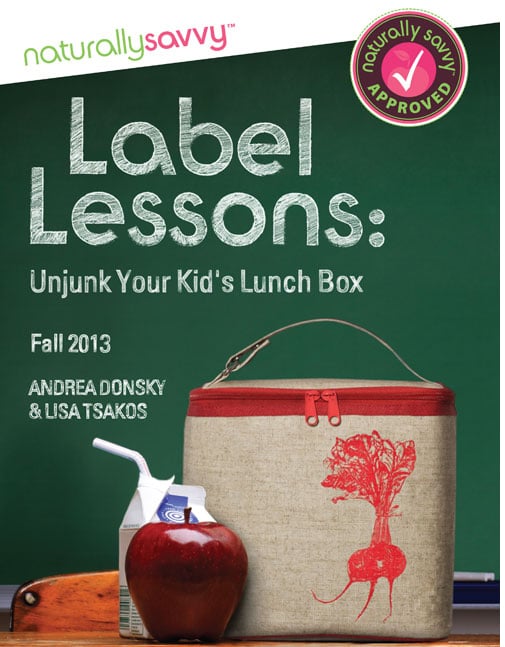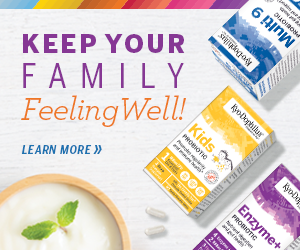
1. Rudi’s 100% Whole Wheat Bread vs. Oroweat 100% Whole Wheat Bread
1. Oroweat website, http://oroweat.com/products/sliced-breads/whole-grains/100-whole-wheat
2. Calcium propionate is the most common preservative used in bread, http://cookingupastory.com/bread-what-are-those-ingredients-on-the-labels
3. Calcium propionate is added to bread as a mold inhibitor, http://sci-toys.com/ingredients/calcium_propionate.html
4. Calcium propionate is linked with irritability, restlessness, inattention and sleep disturbance in some children, http://www.ncbi.nlm.nih.gov/pubmed/12173999
5. DATEM is an emulsifier and dough conditioner, http://www.acs.chtf.stuba.sk/papers/acs_0035.pdf
6. DATEM is derived from GM soybeans,
7. Processed breads don’t go stale as quickly as all-natural breads do thanks to the addition of mono- and diglycerides, such as DATEM, http://www.foodproductdesign.com/articles/1998/07/prolonging-bakery-product-life.aspx
8. Mono- and diglycerides and DATEM have 9 calories of fat per gram,
9. Mono- and diglycerides are not represented under Total Fat, Calories or Trans fat, http://www.westonaprice.org/know-your-fats/mono-and-di-glycerides
10. Mono- and diglycerides and DATEM may be trans fats, http://www.diabetes.co.uk/food/trans-fats.html,
11. Trans fats affect cholesterol levels, http://www.mayoclinic.com/health/trans-fat/CL00032
12. Calcium sulfate is gypsum, http://www.thefreedictionary.com/Calcium+sulfate+dihydrate
13. Use of calcium sulfate in bread making, http://www.usg.com/rc/technical-specifications/fillers/food-grade-calcium-sulfate-for-baking-industry-technical-specifications-en-IG130.pdf
14. Potassium bromate – highly toxic and a known carcinogen, http://www.inchem.org/documents/iarc/vol73/73-17.html
15. Chlorine oxide is used to produce flour’s while color, http://www.relderton.co.uk/bread-additives.htm
16. Alloxan destroys pancreas cells, causing diabetes in lab animals. http://articles.mercola.com/sites/articles/archive/2009/03/26/The-Little-Known-Secrets-about-Bleached-Flour.aspx
17. Azodicarbonamide, http://www.inchem.org/documents/cicads/cicads/cicad16.htm#PartNumber:9
2. Uncle Matt’s Organic Apple vs. Welch’s Chillers Fruit Punch
1. HFCS in soda is largely to blame for America’s obesity epidemic, http://ajcn.nutrition.org/content/79/4/537.abstract?ijkey=db4de5a3da4786d33d6bdc66bc6b5743dfa6d846&keytype2=tf_ipsecsha
2. 2012 Mintel survey, HFCS, http://www.cornnaturally.com/consumer-research/mintel-research-on-hfcs/
3. High-fructose corn syrup made from genetically modified corn,
4. Rat study, GMOs in corn, http://www.ijbs.com/v05p0706.htm
5. FDA’s position on artificial colors as a potential cause of adverse effects in children, http://www.ncbi.nlm.nih.gov/pmc/articles/PMC3261955/
6. Phytochemicals in apples may help calm inflammation in the airways, http://news.bbc.co.uk/2/hi/health/6684757.stm
7. Most brands of apple juice are made from apple concentrate sourced from China, http://www.marketplace.org/topics/world/apple-product-china-might-come-surprise
8. Pulpy, non-clarified apple juice has more antioxidants than clear apple juice, http://www.nbcnews.com/id/16651652/ns/health-diet_and_nutrition/t/cloudy-apple-juice-packs-more-antioxidants/#.UakEMevudic
9. Antioxidants, http://www.medterms.com/script/main/art.asp?articlekey=11291
10. Apple juice has been shown to protect the cells of the large intestine, http://onlinelibrary.wiley.com/doi/10.1002/mnfr.200500194/abstract, http://www.readersdigest.ca/food/diet-nutrition/7-health-benefits-apples?id=4
11. Apple juice protects the nervous system and delays neurodegeneration, http://www.sciencedaily.com/releases/2009/01/090122100826.htm, http://www.readersdigest.ca/food/diet-nutrition/7-health-benefits-apples?id=3
3. Barbara’s Snackimals Cereal vs. Kellogg’s Corn Pops
1. Corn Pops likely contain GMOs, http://www.naturalnews.com/037315_Monsanto_GM_corn_breakfast_cereals.html
2. Children are more susceptible to the effects of GMOs, https://nsavvy.wpengine.com/natural-and-organic/the-dangers-gmos-pose-to-children
3. GMOs & children,
4. BHT added to food as a preservative, http://chemistry.about.com/od/foodcookingchemistry/a/bha-bht-preservatives.htm
5. BHT added to cereal packaging to preserve freshness, , page 6.
6. BHT linked to hyperactivity in children, http://www.examiner.com/article/bht-the-harmful-food-additive-your-everyday-diet
7, 8. BHT toxic to mice and rats, http://www.ncbi.nlm.nih.gov/pubmed/3757972)
9. BHT may promote tumors and mimic estrogen, http://davidsuzuki.org/issues/health/science/toxics/chemicals-in-your-cosmetics—bha-and-bhti/) THIS FOOTNOTE # WAS NOT INCLUDED IN THE E-BOOK. KEEP IT LISTED BELOW REF. 7&8 BUT WITHOUT A NUMBER
9,10. Froot Loops website and ingredients, http://www.kelloggs.com/en_US/KelloggrsquosFrootLoops.html
11. Yellow corn rich in antioxidants, http://www.whfoods.com/genpage.php?tname=foodspice&dbid=90
12. Carotenoids, Discovery Health: http://health.howstuffworks.com/wellness/food-nutrition/vitamin-supplements/what-are-carotenoids.htm
13. Health benefits of milled yellow corn, http://www.ncbi.nlm.nih.gov/pubmed/18937488
BHT added to packaging
According to Eastman (Tenox TM Antioxidants):
Volatilization.
Antioxidants may also be added to packaging materials such as wax paper, polyethylene, and paperboard through volatilization, the antioxidants will penetrate the food product, providing protection additionally, some packaging materials are susceptible to oxidation and will benefit from the presence of the antioxidant. BHA and BHT are good candidates for this type of addition due to their volatility at ambient temperatures.
4. Barlean’s Omega Swirls vs. Yoplait Go-Gurt Strawberry Banana
1.Yogurt is a healthy snack rich in calcium and protein, and it is easier to digest than milk, http://www.askdrsears.com/topics/family-nutrition/yogurt/10-reasons-yogurt-top-health-food
2. Red 40 contains benzidene, a human and animal carcinogen, http://www.ncbi.nlm.nih.gov/pmc/articles/PMC2957945/#b2-ehp-118-a428
3. Red 40 contains p-Cresidine, an animal carcinogen which is “reasonably anticipated to be a human carcinogen,”
4. Annatto health benefits, (Vitamin E tocotrienols from annatto)
5. Annatto can cause severe reactions in children,
6. Reactions to annatto – skin, GI, respiratory, CNS, http://fedup.com.au/factsheets/additive-and-natural-chemical-factsheets/160b-annatto, http://journals.lww.com/jcge/Fulltext/2009/11000/Annatto,_Diet,_and_The_Irritable_Bowel_Syndrome.3.aspx, http://allergies.about.com/od/foodallergies/a/foodadditives.htm,
7. Reactions to annatto – headaches, head banging, http://fedup.com.au/stories/2011/1075-annatto-160b-headbanging-rage-trichotillomania-hair-eyelash-eyebrow-pulling-december-2011
8. Recommended Omega-3 intake for kids, http://www.dhaomega3.org/Overview/DHAEPA-and-the-Omega-3-Nutrition-Gap-Recommended-Intakes
9. DHA is essential to brain development, and EPA influences behavior and mood, http://www.ncbi.nlm.nih.gov/pubmed/18072818
10. Your body can’t make omega-3. You have to get it from food or from supplements containing EPA and DHA, http://www.hsph.harvard.edu/nutritionsource/omega-3-fats/
11. Omega-3 improves behavior and learning in kids,
12. Omega-3 may reduce ADHD symptoms in children, http://www.ncbi.nlm.nih.gov/pubmed/21807480
13. Omega-3 may improve reading and behavior in underperforming children, http://www.plosone.org/article/info%3Adoi%2F10.1371%2Fjournal.pone.0043909
14. Omega-3 may improve aggression and impulsive behavior,
15. Increased omega-3 fish oil consumption may improve hyperactive and aggressive behavior in kids, , , http://www.ncbi.nlm.nih.gov/pubmed/21807480
16. Removing all Scary Seven ingredients from the diet may improve hyperactive and aggressive behavior in kids, http://www.npr.org/2011/03/30/134962888/fda-probes-link-between-food-dyes-kids-behavior, http://foodmatters.tv/articles-1/which-food-additives-make-children-behave-badly
17. Eating non-GMO foods may improve hyperactive and aggressive behavior in kids,
18. Removing salicylates from the diet may improve hyperactive and aggressive behavior in kids, http://www.autism-help.org/intervention-bio-salicylate-feingold.htm
“Many studies show that 70% or more of hyperactive children respond positively to the removal of synthetic additives, especially when salicylates or allergens are removed.”
19. Identifying food allergens may improve hyperactive and aggressive behavior in kids, http://www.foodforthebrain.org/smart-kids/childrens-food-allergies.aspx
5. GoGo squeeZ Organic Peach vs. Applesauce – Mango Peach
1. Food manufacturers know that our taste buds love sugar,
2. Sugar is sometimes added to fruit-based foods (such as jams or pureed fruit) as a preservative, http://familydoctor.org/familydoctor/en/prevention-wellness/food-nutrition/sugar-and-substitutes/added-sugar-what-you-need-to-know.html
3. High-fructose corn syrup is considered one of the leading causes of childhood obesity, http://www.huffingtonpost.com/2012/11/27/high-fructose-corn-syrup-diabetes-hfcs-type-2_n_2194173.html
4. Yellow 6 has been implicated in increasing hyperactive behavior in children, http://www.mayoclinic.com/health/adhd/AN01721
5. Synthetic dyes are often added to enhance a food's natural colors and to offset color loss after processing,
6. Artificial dyes do not serve any health or nutritional purpose, http://www.mayoclinic.com/health/adhd/AN01721
7. Apples rank high on the satiety index, which means they keep you feeling full longer than most other foods, http://www.mendosa.com/satiety.htm
8. GoGo squeeZ partners with TerraCycle,
9. The health benefits of apples include reducing cholesterol,
10. The health benefits of apples include reducing the risk of heart disease, http://www.news.ucdavis.edu/search/news_detail.lasso?id=5585
11. The health benefits of apples include protection against colon cancer, http://carcin.oxfordjournals.org/content/26/7/1291.abstract
12. The health benefits of apples include reducing the risk of osteoporosis, http://cat.inist.fr/?aModele=afficheN&cpsidt=17327181
13. The health benefits of apples include reducing the risk of developing Alzheimer’s Disease, http://www.readersdigest.ca/food/diet-nutrition/7-health-benefits-apples?id=3
14. Many of the health effects are due to an apple’s flavonoids (such as quercetin), phenolic acids and fibers, specifically the soluble fiber pectin, http://www.nutritionj.com/content/3/1/5
6. Country Choice Organic Sandwich Cookies vs. Oreo Cookies
1. An average of 17% of a teenager’s calories comes from added sugar, http://learning.blogs.nytimes.com/2013/03/13/investigating-science-and-health-questions-about-sugar-and-our-bodies/
2. The liver converts much of HFCS to fat, inducing insulin resistance, http://www.nutritionandmetabolism.com/content/2/1/5
3. Insulin resistance is a major cause of obesity and the underlying factor in heart disease, type 2 diabetes, and many cancers, http://www.nytimes.com/2011/04/17/magazine/mag-17Sugar-t.html?pagewanted=all&_r=0
The New York Times, “Is Sugar Toxic?” by Gary Taubes, Published April 13, 2011.
“This apparently induces a condition known as insulin resistance, which is now considered the fundamental problem in obesity, and the underlying defect in heart disease and in the type of diabetes, type 2, that is common to obese and overweight individuals. It might also be the underlying defect in many cancers.”
4. Types of HFCS, http://www.ers.usda.gov/topics/crops/sugar-sweeteners/background.aspx#hfcs (under subheading, “High-Fructose Corn Syrup Production and Prices”)
5. HFCS-90 has 90% fructose, http://www.citizens.org/hfcs-fda-allowing-illegal-ingredient-in-foods-beverages/
6. High consumption of fructose contributes to obesity, http://www.bloomberg.com/news/2013-01-01/fructose-tied-to-obesity-as-study-shows-it-doesn-t-cut-appetite.html
7. Food manufacturers are not required to specify which type of high-fructose corn syrup is used in their products,
http://www.citizens.org/hfcs-fda-allowing-illegal-ingredient-in-foods-beverages/
8. Oreo is the world’s best selling cookie, http://www.huffingtonpost.com/2013/03/06/oreo-101-birthday_n_2820299.html
9. Oreo’s Facebook page ranks #11 among the top brand Facebook pages in the world, http://fanpagelist.com/category/brands/
10. If sugar isn’t labeled ‘organic’, it likely comes from GM sugar beets, http://www.nongmoshoppingguide.com/tips-for-avoiding-gmos.html
“Sugar If a non-organic product made in North American lists “sugar” as an ingredient (and NOT pure cane sugar), then it is almost certainly a combination of sugar from both sugar cane and GM sugar beets.”
11. Organic sugar is from organic sugar cane stalks and provides some B vitamins, calcium and potassium,
12. Children aged 7-10 need an average of 1,800 calories per day, http://www.nhs.uk/chq/Pages/how-many-calories-do-children-need.aspx?CategoryID=51&SubCategoryID=163
7. San-J sushi packets bonus page
1. Sushi now served at some Florida schools, ; http://www.babble.com/mom/chocolate-milk-out-sushi-in-school-lunch-gets-an-l-a-style-makeover/
2. Sushi lunches sell out within the first week at Pasco Country Public Schools, http://www.delish.com/recipes/cooking-recipes/best-school-cafeterias#slide-2;
http://www.pasco.k12.fl.us/nutrition/sushi_tuesdays_at_john_long_middle
3. Ginger improves digestion and boosts immunity. http://www.besthealthmag.ca/eat-well/healthy-eating/the-health-benefits-of-sushi?slide=5
4. Nori, the seaweed used to make sushi, is one of the best sources trace minerals, including thyroid-balancing iodine, http://envirohealthtech.com/sea_vegetation.htm
5. Wasabi has been shown to kill bacteria, including H. Pylori. http://www.ncbi.nlm.nih.gov/pubmed/15246236
6. Sushi made with fish is an excellent source of omega-3, http://www.sushifaq.com/sushiotaku/2006/08/17/the-health-benefits-of-sushi-omega-3-fatty-acids/
8. Rudi’s Gluten-Free Multigrain Sandwich Bread
1. What is gluten?
2. Gluten can damage the intestines, http://celiac.nih.gov/TissueDamage.aspx
3. Gluten-related disorders, http://www.biomedcentral.com/1741-7015/10/13
4. Incidence of celiac disease, celiac disease. http://www.celiaccentral.org/celiac-disease/facts-and-figures/
5. Symptoms of celiac disease, http://www.celiaccentral.org/Celiac-Disease/Symptoms-Checklist/138/
6. NCGS is an immune response and is not the same as Celiac Disease,
http://www.questdiagnostics.com/dms/Documents/Other/celiac/gluten-disorders.pdf Under subheading, “What is non-celiac gluten sensitivity?”
7. Symptoms of NCGS, http://www.questdiagnostics.com/dms/Documents/Other/celiac/celiac-symptoms.pdf
8. Incidence of NCGS, http://www.questdiagnostics.com/dms/Documents/Other/celiac/gluten-disorders.pdf
9. Incidence of CD, http://www.celiaccentral.org/celiac-disease/facts-and-figures/
10. BT toxin destroyed during digestion according to Monsanto, http://digitaljournal.com/article/326208
11. BT corn damages intestinal cells causing leakage, http://www.biotech-info.net/bt_cummins.html
12. BT corn may be a reason behind celiac disease and gluten intolerance, Jeffrey Smith in a presentation at the Total Health Show, Toronto, Ontario, March 2013.
Cyrex Laboratories, https://www.cyrexlabs.com/CyrexTestsArrays/tabid/136/Default.aspx










